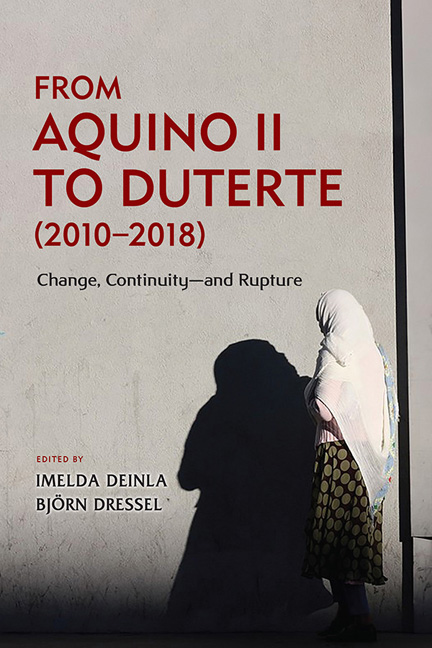Book contents
- Frontmatter
- Contents
- List of Tables
- List of Figures
- Acknowledgements
- Acronyms and Glossary
- Contributors
- Introduction: From Aquino II to Duterte (2010–2018): Change, Continuity—and Rupture 1
- PART I POLITICS AND GOVERNANCE
- PART II ECONOMIC GOVERNANCE
- PART III PEACE PROCESS IN MINDANAO
- 7 Prospects for Lasting Peace in Mindanao: Peacemaking and Peacebuilding under the Aquino and Duterte Administrations
- 8 Prospects for the Normalization Process in the Southern Philippines: An Architecture of Uncertainty?
- PART IV INTERNATIONAL ENVIRONMENT
- Index
7 - Prospects for Lasting Peace in Mindanao: Peacemaking and Peacebuilding under the Aquino and Duterte Administrations
from PART III - PEACE PROCESS IN MINDANAO
Published online by Cambridge University Press: 31 January 2020
- Frontmatter
- Contents
- List of Tables
- List of Figures
- Acknowledgements
- Acronyms and Glossary
- Contributors
- Introduction: From Aquino II to Duterte (2010–2018): Change, Continuity—and Rupture 1
- PART I POLITICS AND GOVERNANCE
- PART II ECONOMIC GOVERNANCE
- PART III PEACE PROCESS IN MINDANAO
- 7 Prospects for Lasting Peace in Mindanao: Peacemaking and Peacebuilding under the Aquino and Duterte Administrations
- 8 Prospects for the Normalization Process in the Southern Philippines: An Architecture of Uncertainty?
- PART IV INTERNATIONAL ENVIRONMENT
- Index
Summary
INTRODUCTION
The Philippines has an impressive record of securing political settlements with non-state armed groups. However, its record for implementing them is disappointing. This is not unusual. Many peace agreements have been signed around the world in the last fifty years and as many as half of them fail. But the Philippines’ inability to move from peacemaking to peacebuilding has left parts of the country stuck in an uncomfortable equilibrium of low-level conflict and poverty.
There are few signs so far that the government of President Duterte has the capacity to build a just and lasting peace that addresses the root causes of the conflict in Mindanao of historical injustice, insecurity, weak governance and lack of economic opportunity. The emergence of violent extremism linked to the so-called Islamic State (IS)—epitomized by the May 2017 attack on Marawi City—demonstrates how violence can evolve in disturbing new directions when these issues are left to fester.
There is still time to turn things around. The Bangsamoro Organic Law (BOL) was finally passed by Congress in July 2018, delivering the core of the 2014 Comprehensive Agreement on the Bangsamoro (CAB). Pursuant to the BOL, a new autonomous political entity will be established in 2019 to replace the existing Autonomous Region in Muslim Mindanao (ARMM). This provides the peace process an anchor and some welcome impetus. A number of the major armed groups have expressed support for the BOL, increasing the prospects of stability in the immediate term. However, delivering on the promise of the BOL to deal once and for all with the “Bangsamoro problem” requires decisive and sustained action to strengthen institutions, counter the threat of violent extremism and tackle entrenched poverty in conflict-affected Mindanao. Failure to do so would see the situation continue to drift into highly dangerous territory for security in the Philippines and Southeast Asia as a whole.
Drawing on nearly ten years of direct participation in most aspects of the peace process in Mindanao, this chapter reviews achievements of the administration of Benigno Aquino III, highlighting successes on peacemaking and critiquing a peacebuilding approach that never moved sufficiently beyond confidence-building measures.
- Type
- Chapter
- Information
- From Aquino II to Duterte (2010–2018)Change, Continuity—and Rupture, pp. 207 - 238Publisher: ISEAS–Yusof Ishak InstitutePrint publication year: 2019



